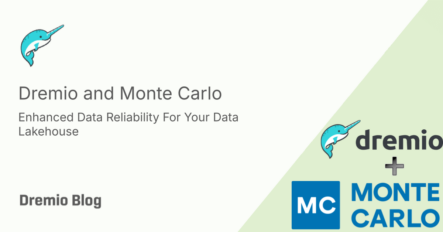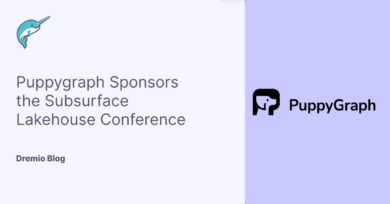12 minute read · September 20, 2024
Dremio and Monte Carlo – Enhanced Data Reliability For Your Data Lakehouse

· Technical Evangelist, Dremio

A Powerful Partnership
Data reliability, quality, and observability are crucial for organizations to make informed decisions. Integrating Monte Carlo, a leading data observability platform, and Dremio’s Unified Lakehouse Platform, brings powerful data observability capabilities to your lakehouse. Connecting the platforms is straightforward and easy to implement, offering tangible benefits to data-driven enterprises.
Monte Carlo: Advanced Data Observability
Monte Carlo is an advanced data observability platform that provides comprehensive visibility across complex data ecosystems. Within a Dremio Lakehouse environment, Monte Carlo detects data anomalies, alerts relevant teams, and facilitates rapid issue resolution. The platform also offers sophisticated tools for monitoring data quality dimensions, including schema changes and custom-defined rules.
Integration: Connecting Dremio to Monte Carlo
The integration process between Dremio and Monte Carlo is streamlined, and requires minimal configuration. Here's a detailed look at the technical steps involved:
- Prerequisites: Ensure your system installs the Monte Carlo CLI (version 0.104.1 or higher).
- Authentication: Generate a Personal Access Token (PAT) in your Dremio environment. This token will authenticates Monte Carlo's access to Dremio.
- Integration Command: Utilize the Monte Carlo CLI to establish the connection. The command structure is easy to follow:
For Dremio Cloud deployments, the command is structured like this:
Monte Carlo Monitoring Capabilities for Dremio
Monte Carlo offers several monitoring capabilities tailored for Dremio lakehouse environments:
- Schema Change Detection: Monte Carlo automatically monitors and alerts on schema changes within your Dremio datasets. This feature is crucial for maintaining data consistency and preventing unexpected breaks in downstream processes.
- Custom SQL Rules: This powerful feature allows you to define bespoke data quality checks using SQL queries. These rules are tailored to your business logic and data quality requirements.
- Comparison Rules: This advanced functionality enables you to compare the results of two different SQL queries. These are is particularly useful for validating data consistency across various sources or transformations within your data ecosystem.
Examples of SQL Rules and Comparison Rules
To illustrate the power and flexibility of Monte Carlo's monitoring capabilities within a Dremio lakehouse environment, let's explore examples of SQL Rules and Comparison Rules that can be easily implemented.
SQL Rule Examples:
Data Integrity Check:
- This rule checks for null IDs or non-positive values in a critical field, alerting you to potential data integrity issues.
Date Range Validation:
- This rule ensures that all transaction dates fall within an expected range, flagging any potentially erroneous historical or future-dated entries.
Referential Integrity:
- This rule identifies any orphaned records in a child dataset, helping maintain referential integrity across your data model.
Comparison Rule Examples:
Source-to-Target Reconciliation:
- This comparison rule ensures that the record count and total amount match between a source and target dataset for the previous day's data, alerting you to any discrepancies in your ETL processes.
Data Transformation Validation:
- This rule compares the distribution of categories before and after a data transformation, helping you validate that your category mapping or data enrichment processes are working correctly.
Configuring Alerts and Notifications
Monte Carlo provides a sophisticated notification system to ensure that the right stakeholders are promptly informed about data issues:
- Audience Creation: Define audiences within Monte Carlo, including notification channels like Slack, email, Microsoft Teams, and more.
- Notification Settings: Configure granular notification settings for each audience, specifying the types of alerts they should receive based on criticality and relevance.
- Custom Monitor Alerts: You can set up specific notification preferences for SQL Rules and Comparison Rules during the monitor creation process, ensuring that alerts are routed to the most appropriate teams or individuals.
Benefits of Integrating Monte Carlo with Dremio
The integration of Monte Carlo with Dremio’s Unified Lakhouese Platform offers numerous benefits for organizations seeking to enhance their data reliability:
- Enhanced Data Quality Assurance: Organizations can maintain high data quality standards within their Dremio environment by leveraging schema change detection and custom SQL checks.
- Proactive Issue Detection: The ability to create custom SQL Rules and Comparison Rules allows for the early detection of data quality issues, often before they impact downstream analytics or business processes.
- Reduced Mean Time to Detection (MTTD): Automated monitoring and real-time alerting significantly decrease the time between the occurrence of a data issue and its discovery, enabling faster resolution.
- Improved Cross-functional Collaboration: The flexible notification system fosters better collaboration between data teams, business users, and other stakeholders in addressing and resolving data quality concerns.
- Customized Monitoring Framework: SQL Rules provide the flexibility to implement monitoring specific to your organization's unique business logic and data quality requirements.
- Cross-Source Data Validation: Comparison Rules enable the validation of data consistency between Dremio and other data sources, ensuring data integrity across the entire data ecosystem.
- Enhanced Trust in Data Assets: By implementing comprehensive monitoring and rapid issue resolution, organizations can build and maintain trust in their data assets, supporting more confident decision-making.
A Powerful Combination
Integrating Monte Carlo with Dremio’s Unified Lakehouse Platform provides a robust framework for implementing advanced data observability practices in a data lakehouse environment. By leveraging this powerful combination, organizations can significantly improve their data reliability, catch issues early, and maintain the integrity of their data assets. As data continues to play an increasingly critical role in business operations and decision-making, such integrations are not only beneficial but critical for maintaining a competitive advantage in the data-driven landscape.
Continue Learning
- Get Started with Dremio
- The fastest SQL engine with the best price-performance for Apache Iceberg, built on Apache Arrow
- Monte Carlo Dremio Integration Documentation
- Just Launched: Dremio SQL Query Engine Data Quality Monitoring
- Monte Carlo Comparison Rules Documentation
- Download our FREE O’Reilly Guide


